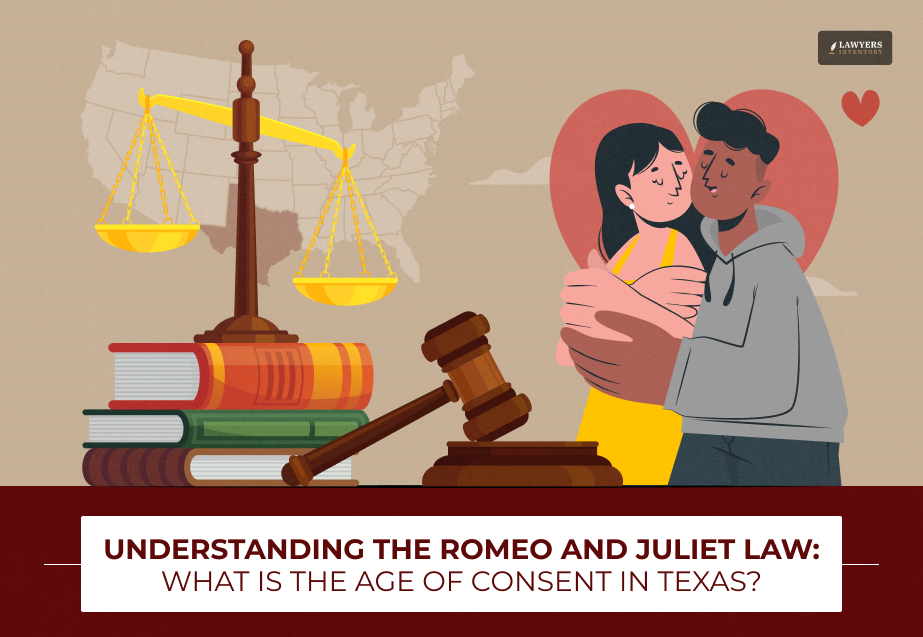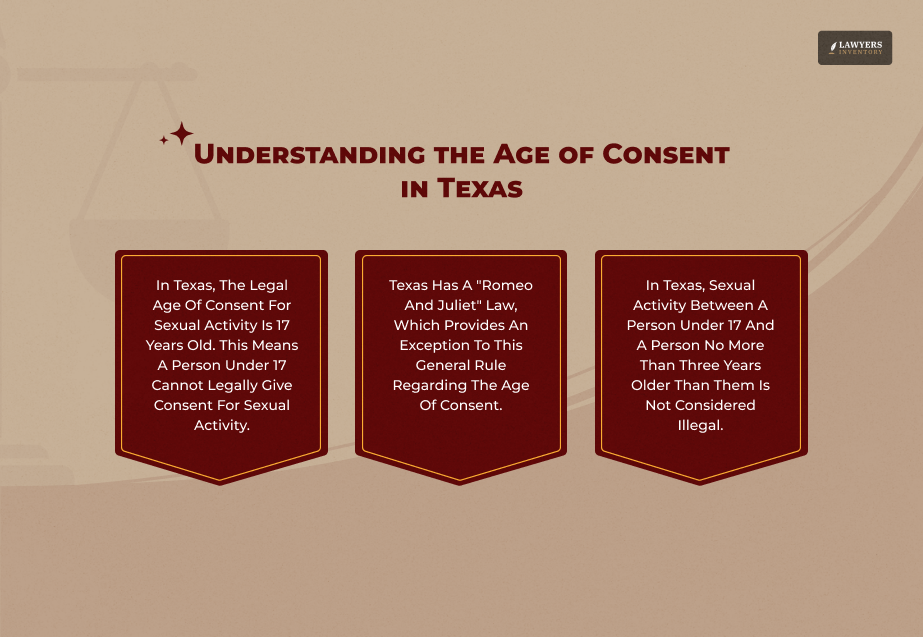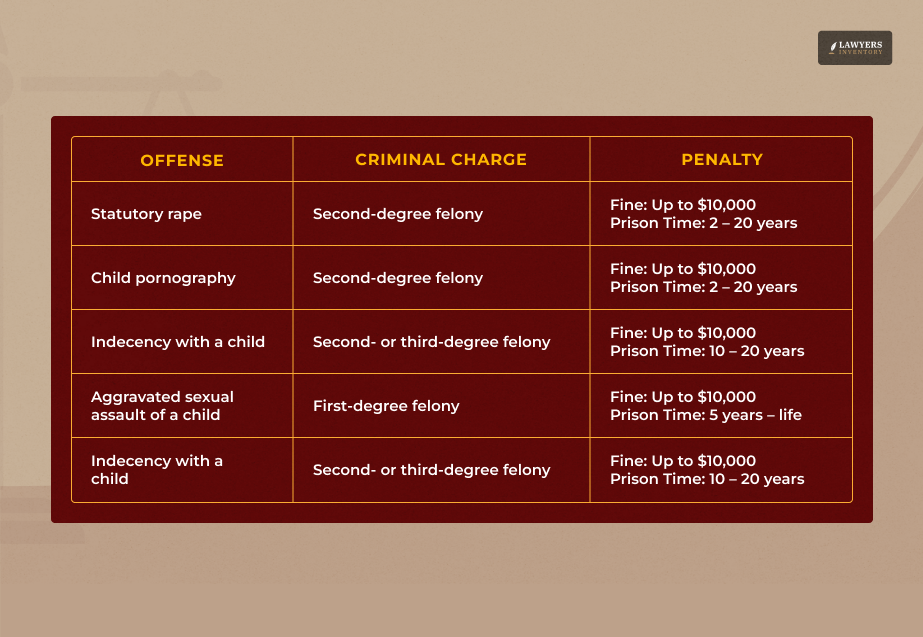
The age of consent in Texas is a very important law that helps protect young people. It tells us how old someone must be before they can legally agree to have sex.
If one person is too young, the law says the other person can get into trouble—even if both people agreed.
That’s why it’s important for everyone, especially teenagers and parents, to understand this law clearly.
But sometimes, things aren’t that simple. What if two teenagers who are close in age really like each other? That’s where something called the Romeo and Juliet Law comes in.
This law helps protect teens in close-age relationships from being punished like adults who hurt minors. But what is it all about?
Hi. In today’s blog, that is exactly what I will be talking about. So, if you are interested to learn about what the age of consent is in Texas, then you are in the right place.
Therefore, keep on reading this article till the end, and thank me later…
What is the Age of Consent in Texas for Sexual Activity?

In Texas, the age of consent is 17 years old. This means that if a person is 17 or older, they can legally agree to have sex with someone else who is also old enough.
But if someone is younger than 17, the law says they’re not old enough to make that kind of decision.
So, if an adult or even an older teen has sex with someone under 17, they can face criminal charges—even if both people said “yes.”
This law is the ultimate tool to keep kids safe from adults who might take advantage of them. The law doesn’t try to stop young people from having feelings—it just wants to make sure they’re not being hurt or pressured by someone older.
So, while it may sound strict, it’s really there to protect teens.
What is the Romeo and Juliet Law in Texas?
The Romeo and Juliet Law is a special rule that says if two people are close in age and both agree to be in a romantic or sexual relationship, they may not get into trouble.
For example, if a 19-year-old and a 16-year-old are dating and they both agree to have sex, the Romeo and Juliet Law might protect the older person from being punished like a criminal.
But this only works if:
- Both people agree.
- They are within 3 years of each other in age.
- The younger person is at least 14 years old.
So, the law says: “Okay, you’re close in age, and it’s not like one person is way older and taking advantage of the other.”
This helps protect teen couples from experiencing criminal treatment for having a relationship with someone close to their age.
What is the Purpose of the Age of Consent in Texas?
The purpose of the age of consent law in Texas is to protect teenagers and children from people who might try to hurt or trick them.
Young people might not always understand how serious sex can be or how it can affect their lives.
That’s why the law steps in to keep them safe until they’re old enough to make those choices responsibly.
The law also helps keep adults and much older people from taking advantage of younger teens.
It draws a clear line—if someone is under 17, it’s not okay for someone older to have sex with them. It doesn’t matter if the younger person said “yes.” The law says they’re not ready yet.
What are the Legal Consequences of Violating the Romeo and Juliet Law in Texas?
If someone breaks this law and is not protected by the Romeo and Juliet Law, they could face very serious trouble. This could include:
- Going to jail for a long time.
- Having to pay a lot of money as a fine.
- Being called a sex offender and being added to the sex offender registry.
Being on that list is a big deal. It can make it hard to get a job, go to school, or even find a place to live. And it’s usually for life.
That’s why it’s super important to understand this law and be careful about who you date and what choices you make.
Even if two teens really love each other, if one is too young or they’re not within the age gap allowed, the older one can still get in legal trouble.
So, it’s not just about feelings—it’s about following the law, too.
Is Sexting a Minor a Violation of the Age of Consent in Texas?
Yes, sexting a minor can be against the law in Texas—even if there’s no physical relationship.
Sexting means sending or receiving pictures or messages with sexual content, usually on phones or the internet.
If one person is under 17 and the other person sends or asks for sexual pictures or messages, that can be a crime.
In some cases, even a teen sending their own picture to someone else can get in trouble. And guess what?
Texas has laws about this to protect minors from being exposed to or sharing sexual content too early. Just like with the age of consent, the law treats this very seriously—even if both people said “yes.”
So remember: Even if it feels like a private chat or just flirting, sexting someone underage is risky and can lead to criminal charges.
Penalties for Sex Crimes Against Minors in Texas
Sex crimes involving minors can lead to very serious punishments in Texas. Depending on how serious the case is, a person can be charged with things like:
- Sexual assault of a child.
- Indecency with a child.
- Online solicitation of a minor.
- Possession or sending of child pornography.
Here are some of the punishments someone might face:
- Jail or prison time (sometimes for many years).
- Fines (thousands of dollars).
- Registration as a sex offender for life.
- Being unable to live near schools or parks.
- Losing the right to vote or carry a weapon.
Here’s a table you need to check out:

Even one mistake can change a person’s life forever. That’s why these laws are so serious. They are not meant to scare people, but to keep minors safe and help adults make better choices.
What to Do If You Are Charged for Violating the Age of Consent in Texas?
If you or someone you know is facing charges of breaking the age of consent law in Texas, don’t wait—get help from a lawyer right away.
These charges are very serious and can affect your entire future. A lawyer can explain what’s going on, help protect your rights, and maybe even show that the Romeo and Juliet Law applies to your case.
Additionally, stay calm. Don’t try to explain things to the police or post anything online about it. What you say might be used against you later. Just tell them you want to speak to a lawyer first.
Also, never contact the other person involved—even if you just want to talk or say sorry. The court might see this as trying to influence the case.
Instead, focus on getting good legal help and letting your lawyer speak for you. The right lawyer can make a big difference in how your case ends.
Read Also:
- 5 Mistakes to Avoid When Filing a Sexual Assault Lawsuit
- Statute of Limitations for Sexual Assault: Are There Time Limits?
- What To Do If You’re Falsely Accused of Domestic Violence in California











0 Reply
No comments yet.